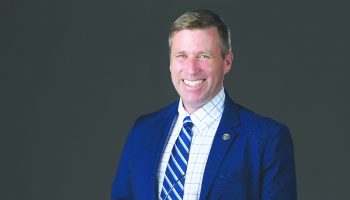COLUMN BY MICHAEL E. HILL
How in the world did we get to the last third of our Summer Assembly?! It boggles the mind, but here we are in Week Seven, and what a week we have in store for you as we explore “The State of the Economy: Where Do We Go From Here?” To say that the last 12 to 18 months have been a rollercoaster would be an understatement, in all its dimensions, but on what ride did that rollercoaster take our economy? In this week, we’ll look at what’s driving the rebuilding of the economy in the wake of, and while still contending with, COVID-19. In the summer of 2021 — a year and a half after the pandemic plunged the U.S. into recession — we examine the state of “recovery” from Main Street to Wall Street; what has been lost and what has thrived; and what the crisis has laid bare in terms of necessary investments and structural reforms. How do we make our economy more resilient?
During this week we consider what building a new economy can and should look like, beyond high employment and growing businesses. Do we want an economy that looks like the one we had on Jan. 1, 2020, or one that is more just in the distribution of wealth? What have we learned in the months following “reopening,” and what are we learning from the approaches of other nations? What — and who — have we deemed essential in this new and evolving economy?
To help us unpack these complex questions, we’re joined by a “who’s who” of guides: American Public Media’s Nancy Marshall-Genzer; the new president of the American Enterprise Institute, Robert Doar; Raphael Bostic, president of the Federal Reserve Bank of Atlanta; and Rebecca Henderson, one of 25 University Professors at Harvard, whose recent book may capture it best: Reimagining Capitalism in a World on Fire.
In our companion Interfaith Lecture Series, we ask an economic question about justice as we look at “Creating an Economy that Works for All.” A society failing to uphold justice for all is not a just society. A just society supports health care, work opportunity and wage justice, and bridges the divides that create life-diminishing inequalities in education and access to essential services. It bridges wealth gaps and promotes the opportunity to thrive for all. In this week, we’ll ask: How do religion and ethical humanism make demands upon economic policy, and what difference does this make? I’m so excited that my friend and Chautauqua favorite Sr. Joan Chittister will lead us off in this exploration. I’ve come to realize that there simply is not a thing Joan cannot dissect with great moral clarity and vision.
Naturally, I’m ecstatic to welcome Harry Connick Jr. to our Amphitheater stage this week. I feel as if his music has been the soundtrack to my life. What a treat to share with you someone who made being a crooner popular again — he has more No. 1 albums than almost any jazz artist living today. What a joy to have him cap off our Week Seven. But don’t look past our arts offerings earlier in the week: the final performance of our 2021 Chautauqua Opera Company Young Artists during Saturday’s Opera & Pops concert with the Chautauqua Symphony Orchestra; the first gala performance of our amazing School of Dance students on Monday; the premiere of Chautauqua Theater Company’s Thurgood, starring Brian Marable, on Friday; and the incredible exhibitions at our world-class Chautauqua Visual Arts Galleries, including the work of the 2021 School of Art cohort. This week on the economy is truly rich and full of artistry as well.
One final note as we start this week: I was so grateful to be with so many of you this past week as we celebrated Old First Night. Chautauqua turned 147 this year, and I think we’ve aged quite well. Thanks for being a part of this very special year and this very important week.


